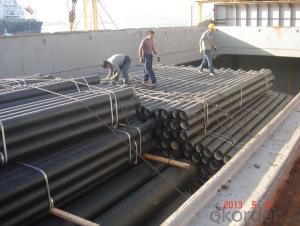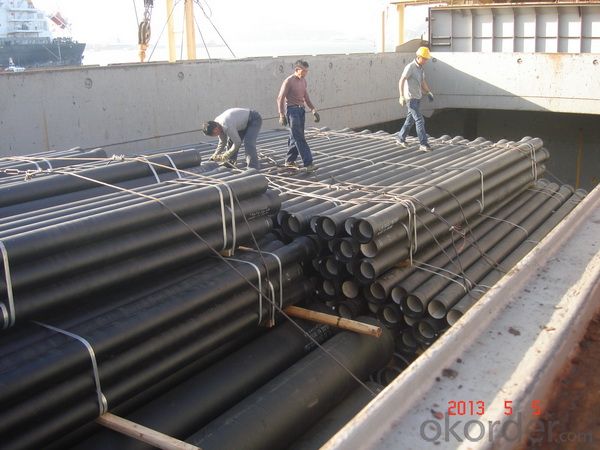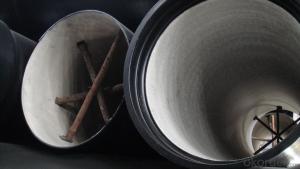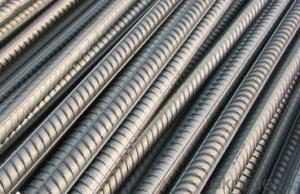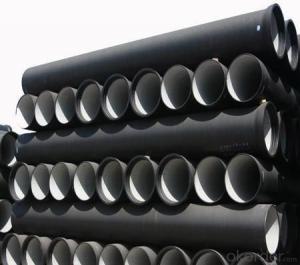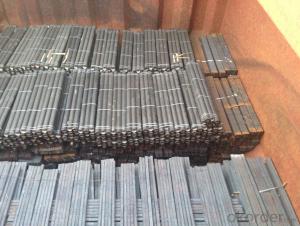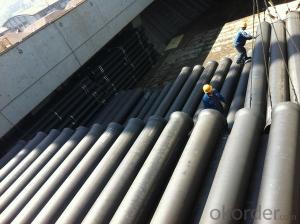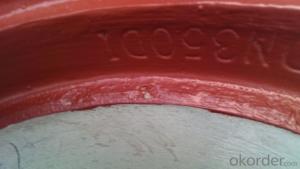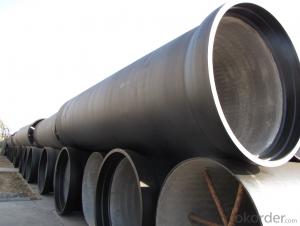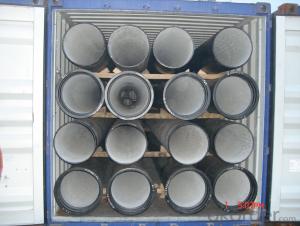ductile iron pipeDN150 C40 Socket Spigot pipe
- Loading Port:
- Tianjin
- Payment Terms:
- TT OR LC
- Min Order Qty:
- 25 m.t
- Supply Capability:
- 30000 m.t/month
OKorder Service Pledge
OKorder Financial Service
You Might Also Like
Specification:
1) The standard of pipe: ISO2531:1998, K9
2) Effective length: 6m
3) Inner cement line: Portland cement line as per ISO4179
4) Zinc coating: at least 130g/m2 as per ISO8179
5) Bitumen painting: at least 70um as per ISO8179
6) With 100% quantity of NBR ring, or SBR ring, or EPDM ring as per ISO4633
7) DN80mm-800mm
8) High strength, lighter than grey iron, good corrosion resistance, no furring, small flow resistance, easy fixing, long life tome about 100 yeas
9) Produced by Hangzhou chunfeng machine
10) Checked by automatic inspection equipment
11) Composition:
Chemical composition | ||||||
Chemical composition | Ductile Cast Iron Pipe (%) | Grey iron pipe (%) | Steel pipe (%) | |||
C | 3.5-4.0 | 3.2-3.8 | 0.1-0.2 | |||
Si | 1.9-2.6 | 1.4-2.2 | 0.15-0.4 | |||
Mn | 0.15-0.45 | 0.4-0.6 | 0.3-0.6 | |||
P | ≤0.06 | ≤0.3 | 0.02-0.03 | |||
S | ≤0.02 | ≤0.1 | 0.02-0.03 | |||
Mg | 0.03-0.06 | |||||
12) Feature:
Mechanical properties | ||||||
Ductile Cast Iron Pipe | Grey Iron Pipe | Steel Pipe | ||||
Tensile Strength(Mpa) | ≥420 | 150-260 | ≥400 | |||
Yield Strength(Mpa) | ≥300 | No Confirmation | No Confirmation | |||
Bending Strength(Mpa) | ≥590 | 200-360 | ≥400 | |||
Elongation (%) | ≥10 | Neglected | ≥18 | |||
Brinell Hardness(HBS) | ≤230 | ≤230 | About 140 | |||
13) T type mechanical joint
14) Packing: in bulk or container
- Q: Are ductile iron pipes suitable for use in irrigation gate systems?
- Yes, ductile iron pipes are suitable for use in irrigation gate systems. Ductile iron is known for its durability, strength, and corrosion resistance, making it an ideal choice for applications requiring reliable and long-lasting piping systems like irrigation gate systems. Additionally, ductile iron pipes have excellent flow characteristics, allowing for efficient water distribution in irrigation systems.
- Q: What material is the cutting tool for ductile iron?
- With pleasure. If necessary, you can also describe your processing work and so on, I help you analyze, recommend a few corresponding knives to you.
- Q: Can ductile iron pipe be used for hot water applications?
- Indeed, hot water applications can make use of ductile iron pipe. Renowned for its robustness, longevity, and exceptional resistance to corrosion, ductile iron pipe proves itself ideal for diverse applications, including hot water systems. Its capability to withstand high temperatures and pressure renders it a dependable choice for the conveyance of hot water. Moreover, its thermal conductivity properties facilitate efficient heat transfer, guaranteeing the effective delivery of hot water throughout the system. Consequently, when evaluating materials for hot water applications, ductile iron pipe emerges as a fitting alternative.
- Q: Can ductile iron pipes be used in areas with high levels of organic matter in soil?
- Yes, ductile iron pipes can be used in areas with high levels of organic matter in soil. Ductile iron pipes are known for their durability and strength, making them suitable for various soil conditions, including those with high levels of organic matter. The pipes are resistant to corrosion and can withstand the chemical reactions that occur in organic-rich soils. Additionally, ductile iron pipes have a smooth interior surface, which reduces the likelihood of organic matter buildup and clogging. However, it is important to consider the specific conditions of the soil and consult with engineers or experts to ensure proper installation and maintenance practices are followed.
- Q: Method for cutting cast iron pipe
- Generally cast iron pipe wall thickness, crisp texture, with traditional saw blade, saw blade cutting, very expensive cutting materials, and cutting accuracy is not high. Nowadays, the cutting tools and cutting machines on the market cut off these kinds of pipes, which are fast and cutting tools. Because the length of the pipe is not cut, the pipe can be continuously cut for a while after the equipment is loaded on the equipment. The worker can spare more time and can realize the operation of more than one machine, thus greatly improving the cutting efficiency. Rotary tool pipe cutting machine cutting cast iron pipe sawdust granular, easy chip removal, cutting section of vertical high, smooth surface without burr. The current equipment has been widely used in cast iron pipe cutting, especially iron pipe cutting, even cylinder car production.
- Q: Nodular cast iron, heat treatment process and so on
- High temperature graphitization annealing was adopted to eliminate the chill, and 900-950 and 2-4H obtained ferrite structure
- Q: Are ductile iron pipes suitable for underground parking structures?
- Yes, ductile iron pipes are suitable for underground parking structures. They are strong, durable, and resistant to external pressures, making them ideal for use in underground environments where they can withstand heavy loads and potential ground movements. Additionally, ductile iron pipes have excellent corrosion resistance, ensuring long-term performance and minimal maintenance in underground parking structures.
- Q: What is the expected sound transmission loss of ductile iron pipes?
- The expected sound transmission loss of ductile iron pipes can vary depending on various factors such as pipe thickness, diameter, and installation conditions. However, ductile iron pipes are generally known for their good acoustic performance and can provide significant sound reduction, especially compared to other types of pipes like PVC or cast iron.
- Q: Are ductile iron pipes resistant to UV radiation?
- No, ductile iron pipes are not resistant to UV radiation.
- Q: Are ductile iron pipes suitable for use in oil refineries?
- Yes, ductile iron pipes are suitable for use in oil refineries. Ductile iron is a type of cast iron that offers a unique combination of strength, durability, and flexibility, making it an excellent choice for various applications, including oil refineries. One of the key advantages of ductile iron pipes is their high tensile strength, allowing them to withstand the high pressure and stress commonly found in oil refining processes. This strength is crucial for the transportation of various fluids, including crude oil, refined petroleum products, and chemicals within the refinery. Additionally, ductile iron pipes have excellent corrosion resistance properties, making them highly resistant to the corrosive effects of oil, chemicals, and other substances typically present in oil refineries. This corrosion resistance ensures the longevity and reliability of the pipes, reducing the need for frequent maintenance and replacement. Furthermore, ductile iron pipes have exceptional ductility, which means they can absorb and withstand significant impacts and vibrations without fracturing or breaking. This quality is advantageous in oil refineries where there may be frequent movement or potential stressors due to machinery, equipment, or ground settlement. Moreover, ductile iron pipes have a smooth interior surface that reduces friction, allowing for efficient fluid flow and minimizing pressure loss. This characteristic is essential in oil refineries, as it helps optimize the transportation of fluids, ensuring a smooth and reliable production process. In conclusion, ductile iron pipes are suitable for use in oil refineries due to their high tensile strength, corrosion resistance, ductility, and smooth interior surface. These pipes provide a reliable and durable solution for transporting various fluids within the refinery, contributing to the efficient and safe operation of oil refining processes.
Send your message to us
ductile iron pipeDN150 C40 Socket Spigot pipe
- Loading Port:
- Tianjin
- Payment Terms:
- TT OR LC
- Min Order Qty:
- 25 m.t
- Supply Capability:
- 30000 m.t/month
OKorder Service Pledge
OKorder Financial Service
Similar products
Hot products
Hot Searches
Related keywords
